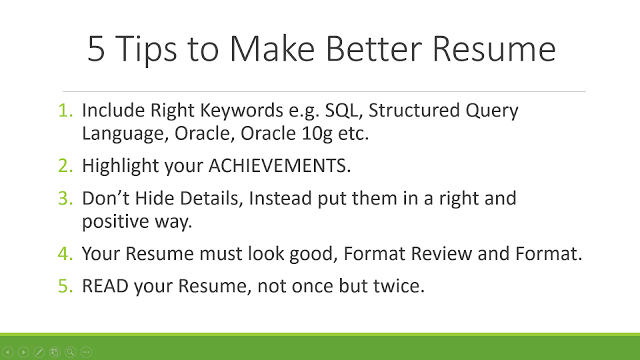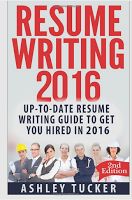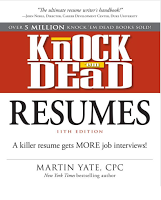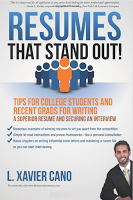Why Programmers should take their CV seriously? 5 Tips to Make Better Resume
Recently I received an email from one of my readers telling me that he is not getting enough interview calls even though he was applying to every possible job he could find in Job portals like Monster.com and Naukri.com. I asked him to send his resume to me and within 30 seconds after opening his CV, I knew why he was not getting any calls. Though he has the right skills and some experience, his resume was not up-to-the-mark, and I am sure it gets filtered by either non-technical people, junior HR or project managers.
I have been interviewing people for the last 10 years and I have been involved in every step of conducting a programming job interview, starting from creating a job description, filtering resumes, taking phone interviews, preparing written test papers and conducting face-to-face interviews. In my experience, I have noticed that one particular problem which costs many developers a potential chance is not paying enough attention to their resume.
It’s very common in good companies to receive 100s of resumes for a handful of positions, and the first thing hiring managers do is, screen resumes and filter candidates for phone interviews. 80% of filtering happens at this stage. Yes 80%. That’s a very high number, but an equally disappointing fact is that most of the resumes are not prepared seriously or they don’t have enough matching skills for the job. Forget about spelling mistakes, formatting errors and lot of clusters, many programmers fail to highlight their achievements, expertise and their USP (Unique Selling Point).
Many programmer doesn’t even remember the stuff they mention in their resume. To give you an example, I have come across many Java developers who claim they are good at C++ in their resume, but when I ask them about their experience and comfort level during a Java phone interview, they tell me that they have just done some academic projects and now don’t remember anything about syntax, concepts or useful details. Some interviewer will not mind this, but I say if you are not comfortable with something, then why state that in your resume at first place? The interviewer, who is picking your resume based upon the skill, knows that you really don’t have hands on experience on that, so it will save time for both of you.
A well prepared resume saves you from Initial filtering
Now coming back to the question, why programmers should take their CV or resume seriously? First thing first, it’s your Resume/CV which gets you an interview call. People form impressions within a few seconds of looking at your resume. Format and layout matter a lot, anything which looks cluttered or ugly are thrown to the dustbin first. It also makes easy for them to scan through it.
For Job agents, hiring consultants and HR people screening or filtering of resume often mean searching for some relevant keywords e.g. low latency, Java, SQL, XML, FIX Protocol, high frequency messaging etc. If your resume has the right keywords, then it will get shortlisted otherwise it will be ignored.
This may sound harsh but just put yourself in the position of someone recruiting for the job you’re looking for. What would give them confidence without meeting you?
Resume Tips: Include variety of keywords
Nowadays, agents are also using computer programs to filter out an irrelevant resume, as they get tons of totally unrelated ones on a daily basis. Since most computer programs look for certain buzzwords, I suggest all programmers include the right keywords in their resume.
You should include SQL if you have worked on it, but also include Structured Query Language and don’t forget to include vendor names e.g. Oracle, MySQL or SQL Server. One more step you can take is to mention versions as well e.g. Oracle 10g, Microsoft SQL Server 2008 or MySQL 5.5, the variety of keywords not only save you from initial filtration but also give your potential interviewer an accurate idea about your experience.
Resume Tips: Highlight Achievements
Another thing you MUST highlight in your resume is ACHIEVEMENTS, Why? because, everybody wants to hire achievers. Your CV should be clear about what you’ve achieved so far. When I see a resume, I always look for is somebody who has achieved something, it could be either in jobs, education or their career.
This is where details matter. Just listing that you are computer science graduate is not enough, list your university and your percentage/GPA. A good university is a very positive sign and so is higher GPA or percentage. Many times the person screening interview knows about the university or turns out to be an alumni.
One thing I have noticed about successful candidates and great programmers is their ability to highlight their problem-solving skills and that really makes a difference. It doesn’t have to be massive achievements, but if you word it properly, it would sound impressive, but don’t exaggerate.
For each job position talk about what you accomplished, what you were responsible for. This is where team size comes into the picture (you should include team size in your project description). If someone is working on the small team, say 2 to 3 people, I can be sure about things he has done, but for large teams, it’s your responsibility to tell me exactly what you done.
Similarly for your education, give a paragraph about your projects. Talk about stuff you’ve done in your spare time, or things you have learned.
Demonstrating what you’ve achieved also helps to steer the interview on your strong areas. Remember an Interview is not a sport or wrestling where the opponent will exploit your weakness, almost all interviewer gives candidate chance to highlight their strength and they query on that. Highlighting your strength on your resume, that will help you to do well in your interview.
So far we have seen tips about what to do, but what NOT to do is equally important. If you keep doing good things without stopping mistakes, you will reach nowhere. DON’Ts are equally important as DOs.
Resume Tips: Don’t Hide Details
The first tip is, Don’t hide details. I personally like to see dates of jobs/education and grades, both on your educational as well as professional certifications (e.g. OCPJP). If you had a career break or dropped out of college, don’t hide it, instead think about how you can present those a positive manner. There is always a right way to say things which are not great.
Resume Tips: Must Look Good
My next tips are about formatting, your resume must look good when someone looked at it. Don’t send your resume in a text file, use Microsoft Word or Adobe PDF. I personally like a PDF resume with a large font.
Write a summary about yourself and your work experience before going into details about the project. Your work experience is the most important thing in your resume and that’s why it should be right up, next thing is your educational qualification and skill set.
Project descriptions should be the last thing in your resume. Try to reduce your resume from 6-page documentary to a 1 or 2 page. No one has that much time to go through all your pages. List your work experience in the reverse chronological order i.e. starting from the most recent job.
Resume Tips: Read Your Resume
My last tip about your CV/Resume is, Please READ your resume, not once but twice. All details on your resume should be on your fingertips, if someone ask you the duration of your project, you should be able to recall dates.
Nothing creates a bad impression as a candidate looking clueless about something he has mentioned in his resume. That’s why I have said it before, weed out unnecessary clutter.
It also makes sense to have multiple copies of resume. In fact, you should you tweak your resume so that it matches well with the job description you are applying for. This is where agents are very helpful.
Here is the summary of my 5 tips to make your resume better:
Bonus Resume Tips: Use your Agent’s Experience
And now a bonus tip, use your agent’s experience. A good agent can really increase your chances, right from getting you interview call to the point of doing negotiation. I always suggest to treat agents respectfully and build repo with them. Don’t think them as middlemen making money and taking cuts, that’s a BIG mistake. Always maintain decency in professional communication.
I know agents who have pointed out some initial mistakes on a resume, helped candidates to correct them and asked them to tweak their CV to suit job description. A good agent also has a good connection with hiring managers and HR, so he can market you better, can also help you on negotiation and can make the difference in few thousands of dollars.
Ultimately both you and your agent have the same goal so take advantage of his experience.
That’s all about why programmers should take their resume/CV seriously because that’s the one which will get you interview call. No matter how much talented you are, you cannot do anything if no one calls you. Rather than always preparing for Interview questions, at least spent 1% of that time on making your resume accurate, clear, concise and beautiful.
These tips may seem small but can yield big gains. By the way, If you struggle to talk about interesting things on your Resume, then that is perhaps an issue. I suggest writing some code in your spare time, contributing on open-source projects, and helping peoples on blogs and forums etc.
Here are the couple of books which will also help you to prepare a better resume:
| Reference: | Why Programmers should take their CV seriously? 5 Tips to Make Better Resume from our JCG partner Javin Paul at the Javarevisited blog. |










I would say that the initial filtering doesn’t even get to the resume. Programmers are filtered even before that by coding tests. Companies will now just using an online programming test service like TestDome (http://www.testdome.com/) to evaluate the skill level of applicants and those who don’t pass get their CV’s thrown in the trash without even a glance. It’s more important to have the required skills that the art of resume writing.